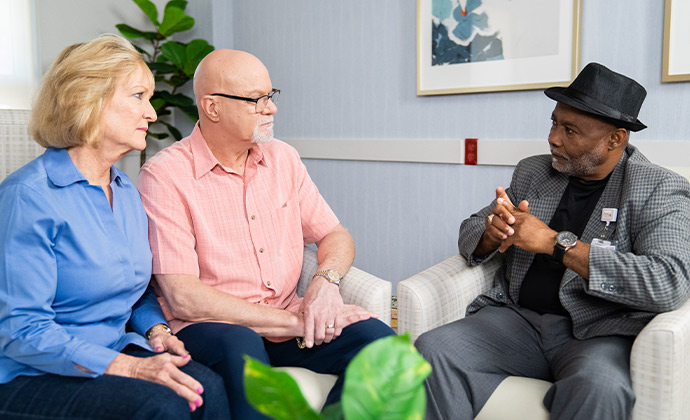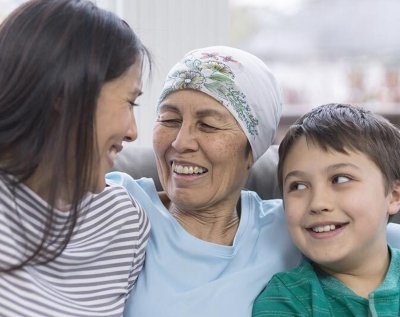Fulfilling the Hospice Journey: Grief & Bereavement Care With VITAS
As loved ones linger nearby, Lead of National Spiritual Services and Chaplain Jason Cooper sits bedside with hospice patients nearing the end of life. His view of grief is informed by many hours spent listening, comforting, and providing spiritual care, which begins on day one of admission.

“Grief hits people in different ways,” he says. “It may evoke many emotions, and it isn’t linear. People swing between stages. Acceptance at one moment can turn into intense despair or anger the next.”
Grief is also a unique experience for everyone.
Emotional and Behavioral Responses to Grief
The grief experts—a VITAS chaplain and clinical social worker—meet with the patient and family members throughout the hospice journey to respond to their individual needs.
“Together, team members address all aspects of care—clinical, emotional, and spiritual,” says Lead of National Psychosocial Services Jessica McClure, LCSW.
“People often feel profound sadness but sometimes also anger, guilt, and maybe relief, especially if their loved one has been suffering for a long time,” says Jason. “Others say they feel numb with a sense of disbelief that this could happen. Some describe a feeling of emotional disembodiment as if they are watching things happen from a distance.”
Typical behavioral responses can be varied, including:
- Withdrawal from friends or family members
- Avoiding places that remind them of their loved one
- Visiting places with shared memories of their loved one
- Delaying sorting through their loved one’s items
- Getting rid of all their loved one’s personal items
- Feeling they must act a certain way and not show too many sad emotions
- Honoring the loved one every chance they get
- Avoiding being alone
Some simply cannot talk about their grief. “People can shut down,” says Jason. “We approach this with sensitivity for their emotional state. We never push them to talk before they’re ready. Instead, we create a safe and supportive environment where they feel comfortable.”
These grief experts can also recommend alternative ways for processing emotions, including art therapy, music therapy, journaling, or other activities that don’t require them to talk about it directly.
“We respect their boundaries and timing,” he says. “We’re available whenever they’re ready to talk.”
How VITAS Provides Grief Support Before, During, and After a Death
With VITAS, the same chaplains and social workers who supported the patient during hospice services also provide grief support. “This allows for more rapport with the caregiver and family members,” says Jessica. “While some hospice providers use a separate department of counselors, we find it beneficial for the bereaved to talk with those who knew their loved one and shared in their experience.”
Medicare specifies that hospice providers must offer twelve months of bereavement support. Yet, VITAS provides 13 months. “The one-year anniversary of a loved one’s death is often very difficult,” explains Jason. “The last thing we want to do is discontinue our support on that anniversary. We extend support for another month to ensure the family can navigate that difficult milestone.”
The VITAS grief support process is multi-tiered. “We provide both condolence calls and visits within the first week or so after the patient’s death,” says Jessica. “Subsequent check-in calls and mailings assist family members or caregivers in building a support system. We help them identify who they can call and what resources they have. VITAS remains available if the grief process changes, and they need different support.”
If additional support is necessary, VITAS connects more often: daily up to every two weeks depending on the severity of the grief.
“We consistently assess this frequency,” says Jessica. “Our volunteers check in with primary caregivers two months following a death. At this time, the caregivers’ support system can begin to dwindle as people resume their lives. The initial year after the death brings many ‘firsts,’ so we send mailings throughout that year to highlight feelings that may arise and how to cope. We want them to know they are not alone, and VITAS is here to help.”
Meanwhile, chaplains assist families in navigating issues that loss brings up—questions about faith, life, and death. “We provide spiritual guidance tailored to the beliefs and traditions of the family,” says Jason. “We may assist in creating meaningful rituals or ceremonies to honor the person who has passed, such as a religious service, a moment of reflection, or something personal that helps the family find closure and begin to heal. We don’t in any way seek to convert or proselytize.”
Why Earlier Hospice May Be Better for the Grieving Process
When a patient dies quickly after entering hospice, loved ones may feel unprepared emotionally and struggle with disbelief. “This sudden loss can make it challenging for family to process grief,” says Jason. “The grief can be more intense. They may feel shocked and struggle to comprehend the sudden change in circumstances.”
When a patient receives hospice care longer, loved ones work through anticipatory grief, or grief that occurs before a loss. “A longer length of stay allows them time to gradually come to terms with the impending loss,” says Jason. “The care team will have more time to encourage open discussion between the patient and their loved ones to facilitate a healthy grief process. This is one of many reasons why it is beneficial to have a longer length of stay in hospice so the team can work with families as soon as possible.”
What Healthcare Providers Can Do
Healthcare providers can support grieving loved ones by being present and validating their emotions. A simple condolence expresses thoughtfulness such as, “I am so sorry for your loss,” or “You and your family are in my thoughts as you grieve this loss.” VITAS can arrange to educate your staff on supporting the bereaved and coping with their own grief as well.
“Be mindful of nonverbal language,” suggests Jessica. “Unintentionally, we can seem as if we are rushing by checking the time or standing near the door. Sit with the client. Notice where your body is facing, even your feet.”
Also, understand that grief isn’t just a passing emotion. “It can deeply affect a person’s well-being,” says Jason. “They might struggle with anxiety, depression, or have trouble concentrating. Some may experience physical symptoms such as fatigue, changes in appetite, or physical pain that is unrelated to any medical condition. Acknowledge these emotions without trying to rush them through their grief.”
Other helpful tips for healthcare professionals include:
- Remember every person’s grief response is unique—there is no right or wrong way to feel
- Actively listen and validate what you hear. For example, if someone says, “I just lost my mom last week, and it’s been really hard,” you might respond with, “I’m sure it’s been incredibly difficult. How are you coping with her loss?”
- Avoid comparisons with your personal experiences which can shut them down. Be aware phrases like, “I know how you feel,” or “I’ve been there before,” or even, “When my mom died, I,” tend to marginalize the other person’s emotional experiences.
- Recognize that you cannot fix it or make it better. Being present with someone who is grieving can be the most effective intervention
Encountering Complicated Grief
Those early in the grief process may need to isolate or sleep more to process the heavy emotions that come with grief. Yet, prolonged, intense grief can become complicated grief. Debilitating grief symptoms may affect the individuals’ day-to-day life for an extended time and become cause for concern. These include struggling with carrying out typical activities and/or:
- Intense sorrow, pain, and rumination over the loss of loved one
- Focusing the loved one's death and little else
- Intense and persistent longing or pining for the deceased
- Problems accepting the death
- Numbness or detachment
- Expressing feelings that life holds no meaning or purpose and/ or not worth living without loved one
- Sharing wanting to have died along with loved one
“Someone who is experiencing complicated grief may have more severe, intense emotional responses and remain in those emotions for a longer time,” says Jessica.
Some risk factors for complicated grief may include:
- Sudden or traumatic loss, such as experiencing the death of a child
- Lack of sufficient social support
- Personal history of mental health struggles
- Unresolved grief from previous losses and/or possibly:
- An estranged relationship which was not mended or explored emotionally with the patient before their death
- The death of a few loved ones in a condensed timeframe
- Insufficient coping skills including, but not limited to, addiction, dependency, etc.
These risks can heighten the grief reaction and indicate additional support may be necessary. Yet, keep cultural differences in mind.
“Some cultures encourage intense visual displays of emotion, which can be perceived as complicated grief, but this is normal grieving for them,” says Jessica. “When cultural differences may be involved, ask questions to learn more.”
For resources on grief and bereavement or to refer your hospice-eligible patient to VITAS, contact us today.

